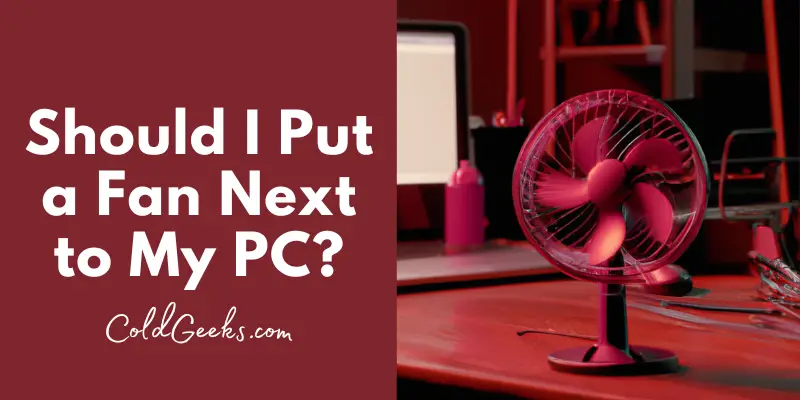Running a PC without proper cooling can result in a variety of problems, from reduced performance to outright hardware failure.
You might be asking yourself, Should I put a fan next to my PC?
You should put a fan next to your PC if it is frequently overheating, your workspace is hot, or the PC’s internal cooling system is ineffective. However, consider factors like noise, power consumption, and dust accumulation before making a decision.
In this guide, you’ll learn the most important things to consider when deciding whether or not to put a fan next to your PC.
15 Things To Consider When Putting a Fan Next to a PC

Let’s dive in and explore this topic, considering 15 important factors to understand the true implications of this seemingly simple decision.
1. Airflow Direction
The airflow direction is crucial to the effectiveness of your fan.
Placing a fan next to your PC can either push air into the PC or pull air away from it. This is dependent on the orientation of the fan.
It’s important to align the fan in a way that it enhances the natural airflow of the PC’s inbuilt cooling system.
If the PC’s fans are designed to pull air in from the front and expel it at the back, your external fan should support this flow.
2. Dust Accumulation
While a fan can indeed increase airflow around your PC, it also has the potential to increase dust accumulation.
Dust can block vents and reduce the efficiency of heat sinks, increasing the temperature of your PC’s components. Regular cleaning will be needed to prevent dust buildup.
If you’re considering placing a fan next to your PC, be prepared for an increase in maintenance.
3. Ambient Temperature
Ambient temperature is a major factor when considering the effectiveness of a fan.
A fan doesn’t cool air; it merely circulates it. If the ambient temperature is high, the fan may not be able to bring down the temperature of your PC significantly.
Conversely, if the room is cool, a fan can help circulate this cooler air around your PC, aiding in heat dissipation.
4. Noise Levels
Depending on its size and speed, a fan can generate a fair amount of noise.
If you’re someone who values a quiet workspace, this is an important factor to consider. Some fans are louder than others, so it’s worthwhile to do your research and look for fans with a low decibel rating for quieter operation.
5. Power Consumption
Power consumption might seem like a minor concern, but it can add up over time.
While most fans don’t consume a lot of power, running a fan continuously can result in a noticeable increase in your electricity bill.
Consider looking for energy-efficient fans to mitigate this.
6. Fan Size and Type
The size and type of the fan are also important considerations. Larger fans can move more air, but also take up more space.
If your workspace is limited, a large fan might not be practical.
Additionally, some types of fans are better suited to cooling PCs than others. For instance, blower fans can direct air in a specific direction, making them potentially more effective than other types of fans.
7. Impact on PC Components
The additional airflow from a fan can have varying impacts on different PC components.
Some components, like the CPU and GPU, can benefit from increased cooling. However, other components, like hard drives, could potentially be harmed by excessive cooling.
These components are designed to operate within a specific temperature range and cooling them excessively can cause them to underperform.
8. Air Quality
Air quality is another important factor to consider.
If the air in your room is dusty or smoky, a fan might do more harm than good by circulating these harmful particles around your PC.
If you’re considering using a fan, you might also want to think about using an air purifier to improve the air quality in your room.
9. Cost of the Fan
Fans come in a wide range of prices, depending on their size, type, and features.
While a fan can be a cost-effective solution compared to more expensive cooling solutions like liquid cooling, the cost can still add up, especially if you opt for a high-end fan.
So, consider your budget when deciding on this.
10. Positioning of the Fan
The position of the fan relative to your PC can have a significant impact on its effectiveness.
Placing the fan too far away might not provide sufficient cooling, while placing it too close could potentially cause other issues, such as excessive noise or vibrations.
The optimal position will depend on a variety of factors, including the layout of your workspace and the specific design of your PC.
11. Humidity Levels
Humidity levels in your room can affect the performance of your fan.
High humidity can make the air feel warmer, reducing the cooling effect of the fan.
On the other hand, low humidity can cause static electricity, which can be harmful to your PC’s components.
If the humidity in your room is often outside the ideal range of 40-60%, you might want to consider using a humidifier or dehumidifier in conjunction with your fan.
12. Fan Speed Control
Some fans come with speed control, allowing you to adjust the speed depending on your PC’s cooling needs.
This can be a useful feature, allowing you to increase the fan speed when doing resource-intensive tasks like gaming or video editing, and decrease it when doing less intensive tasks to save energy and reduce noise.
13. Aesthetics
While not as important as the other factors, aesthetics can still be a consideration for some people.
If you’ve put a lot of effort into creating a visually pleasing workspace, you might not want to disrupt it with a large, unsightly fan.
Fortunately, there are many stylish fans available on the market, so you can likely find one that fits your aesthetic preferences.
14. Longevity of the PC
The temperature of your PC can affect its longevity.
Running your PC hot for prolonged periods can degrade its components over time, reducing their lifespan. By improving cooling, a fan can potentially increase the lifespan of your PC.
However, as mentioned earlier, it’s important to avoid excessive cooling, as this can also be harmful.
15. Alternative Cooling Solutions
Finally, it’s worth considering alternative cooling solutions.
While a fan can be a simple and cost-effective solution, it might not be the best solution for everyone.
If your PC is regularly overheating despite having a well-functioning internal cooling system, you might want to consider more advanced cooling solutions, such as liquid cooling or a dedicated air conditioning unit for your workspace.
Pros and Cons Chart
Check out this pros and cons chart for helping you decide whether or not to place a fan next to your PC:
| Pros | Cons |
| Improves airflow around the PC, potentially reducing its temperature | Can increase dust accumulation, requiring more frequent cleaning |
| Can be a cost-effective solution compared to more advanced cooling solutions | Can increase noise levels, potentially disrupting your workspace |
| Can potentially increase the lifespan of your PC by preventing overheating | Can increase power consumption, leading to higher electricity bills |
| Allows for more flexibility in cooling, especially if the fan has speed control | Might not be effective if the ambient temperature is high |
| Can be easily repositioned or replaced as needed | Can take up a lot of space, depending on the size of the fan |
Do I Need to Put a Fan Next To My PC?
Whether you need to put a fan next to your PC really depends on a few key factors.
Firstly, consider your PC’s current temperature.
If your PC is frequently overheating or running hot during intensive tasks such as gaming or video editing, additional cooling may be necessary.
Monitor the temperature of your PC’s CPU and GPU during these tasks to get a sense of whether additional cooling is required.
Secondly, consider the effectiveness of your PC’s internal cooling system.
Modern PCs are designed with cooling in mind and often include fans, heat sinks, and other cooling components.
If your PC’s internal cooling system is not functioning properly, it might be more effective to repair or upgrade this system rather than adding an external fan.
Finally, consider the ambient temperature of your workspace.
If your workspace is hot, this can increase the temperature of your PC, and an external fan might be helpful in such situations.
However, remember that a fan only moves air around, and won’t cool down a room that’s already hot. In a hot environment, an air conditioning unit might be a more effective solution.
Here is a good video about putting a fan next to your PC:
Is It Safe to Put a Fan Next To My PC?
In general, it is safe to put a fan next to your PC.
However, there are a few safety considerations to keep in mind. First, ensure that the fan is stable and securely positioned so that it won’t fall over and damage your PC.
Second, avoid placing the fan too close to the PC, as this could potentially cause issues with vibrations.
Also, as mentioned earlier, while a fan can help cool your PC, it can also circulate dust and other particles. Over time, these particles can accumulate inside your PC and potentially cause damage.
If you’re using a fan, make sure to regularly clean your PC to prevent dust buildup.
Finally, remember that a fan is an electrical appliance and should be treated with the appropriate safety measures.
Ensure it’s placed on a flat, stable surface, keep it away from water, and don’t leave it unattended for extended periods. Also, make sure the fan’s cables are safely tucked away to prevent tripping or other accidents.
Best Fans To Put Next To My PC
When choosing a fan to put next to your PC, there are a few key factors to consider.
These include the size of the fan, its noise level, power consumption, and the ability to control its speed.
Here are some of the best fans to put next to your computer:
- Honeywell Tower Fan
- Powerbank Desk Fan
- Dyson Pure Cool Air Purifier & Fan (this is my personal favorite)
Remember, the best fan for your PC will depend on your specific needs and circumstances. Consider your workspace, your PC’s cooling needs, and your budget when making your choice.
Final Thoughts: Should I Put a Fan Next to My PC?
In the end, cooling your PC is not just about preventing overheating, but also about preserving its performance and longevity.
While adding a fan can be a simple solution, it’s essential to consider the broader picture.
Remember, a well-cooled PC is a happier, healthier PC that can serve you well for years to come.
Read This Next:
